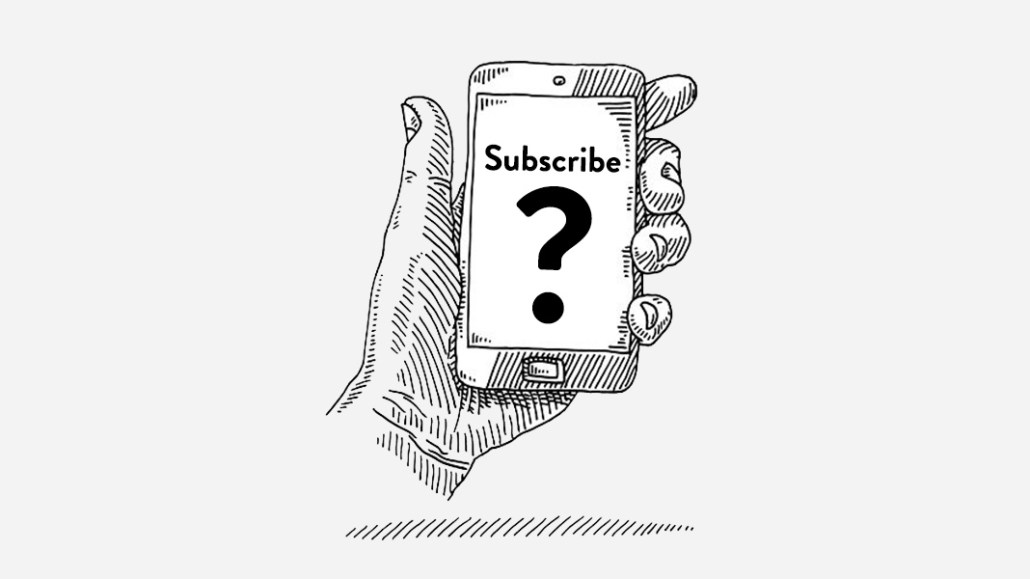Save 50% on a 3-month Digiday+ membership. Ends Dec 5.

Publishers hunting for subscribers like to say they’re delivering an experience worth paying for. Increasingly, that’s starting to mean “one that has no mobile ads.”
Over the past few months, Salon Media Group and Gannett have all begun offering ad-free versions of their mobile apps to subscribers. For Gannett’s USA Today app users, an ads-free experience is sold as a standalone service for $2.99 per month.
For Salon, an ads-free experience is one of several features bundled together into a pricier offering. Salon Premium, which also includes access to a library of video content and documentaries, costs $4.99 a month. Talking Points Memo, which has had a premium tier, TPM Prime, for six years, has leaned on an ad-free experience for a while, though this year it’s focused on putting content behind a paywall.
Selling an ad-free experience is a way to appeal to people who block ads, who essentially deliver zero revenue to publishers. But it also risks cutting off ad revenue from what’s usually the most engaged segment of a publisher’s audience, and a segment that can be monetized through ads more effectively than the typical anonymous visitor.
The idea of getting rid of ads in exchange for digital subscriber or membership fees is not new. Salon began experimenting with an ad-free paid tier in 2001, and Ars Technica has offered ad-free experiences to members for over a decade. Today, Ars Technica offers two: For $25 per year, subscribers get ads blocked, while for $50 per year, subscribers can read Ars Technica in “clean reading mode,” a new article template that doesn’t have any space devoted to advertising at all.
The idea of charging for an ad-free experience is also the idea behind Scroll, a startup led by Chartbeat founder Tony Haile. When it launches, which is set to happen later this year, Scroll users will get an ad-free experience when they visit participating publishers’ sites for a monthly fee, which the publishers will share. It’s signed up publishers including Gannett, Fusion Media Group and Business Insider.
Talking Points Memo offers subscribers a reduced ad experience on its desktop. But these newer ad-free offerings are mobile-only, in part because there’s less revenue for publishers at stake. Mobile site visitors tend to be less valuable than desktop visitors because there’s less real estate for advertising on the smaller screens.
Ad position: web_incontent_pos1
In theory, the lower value of desktop visitors could be offset through higher advertising prices commanded by subscribers. Logged-in readers, whether they’re subscribers or registered users, are much more valuable to advertisers. Gannett calculated that logged-in visitors are worth twice as much in advertising revenue as their anonymous counterparts. Bloomberg Media built a registration wall (and, later, a paywall), in part to deliver more targeted, more personalized advertising to more of its visitors.
But developing new ad experiences for a small subset of users is tricky because most publishers don’t have the subscriber scale that advertisers typically covet.
Jordan Hoffner, Salon Media Group’s CEO, said he’d rather make Salon’s advertising better for everyone, not just subscribers. “The onus is on the publishers to find the best possible ad experience for everybody.”
More in Media

What publishers are wishing for this holiday season: End AI scraping and determine AI-powered audience value
Publishers want a fair, structured, regulated AI environment and they also want to define what the next decade of audience metrics looks like.

Digiday+ Research Subscription Index 2025: Subscription strategies from Bloomberg, The New York Times, Vox and others
Digiday’s third annual Subscription Index examines and measures publishers’ subscription strategies to identify common approaches and key tactics among Bloomberg, The New York Times, Vox and others.

From lawsuits to lobbying: How publishers are fighting AI
We may be closing out 2025, but publishers aren’t retreating from the battle of AI search — some are escalating it, and they expect the fight to stretch deep into 2026.
Ad position: web_bfu




